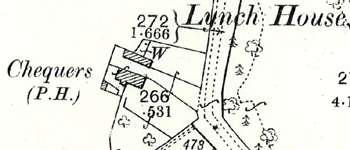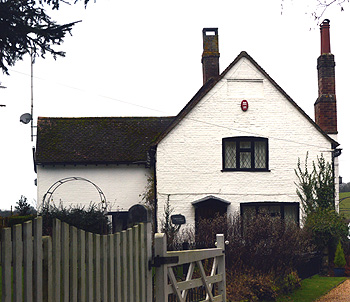The Chequers Public House Kensworth

The Chequers on a map of 1901
The Chequers Public House: Kensworth Lynch
Today this former public house is a private house, called Chequers Cottage. Bedfordshire and Luton Archives and Records Service has no records relating directly to the pub because it was owned by an out-county brewer and, being in Kensworth, the property was in Hertfordshire until 1897 when the parish was transferred to Bedfordshire. It is listed in a licensing register ending in 1901 [PSL6/1] and in a countywide register of 1903
This latter register states that the owner was Benskin & Company of Watford [Hertfordshire]. The public house was “out of repair, dirty and [sanitation was] unsatisfactory”. The nearest licensed premises was 900 yards away (the Pack Horse] and the Chequers was described as having a front door and a door at the side.
The Luton News of 1st March 1904 reported the end of the Chequers: “Evidence showing the unsuitability of this house for licensing purposes was given by Superintendent Tydeman. It was half-a-mile, he said, from the next licensed house and all the cottages between were nearer the other public-houses. The license was not necessary to meet the requirements of the neighbourhood”.
“Dr. Boyes applied for the renewal. He explained that the house held a six-days’ license and ventured to think that, on the evidence adduced, the magistrates would scarcely be guilty of taking away a license which had been in existence for so many years. Last year many such licenses were taken away, but the country seemed to have revolted against those powers. Legislation was impending, and would have been brought before Parliament before that time, but for the illness of Mr. Balfour [prime minister 1902 to 1905]. Compensation was one of the great questions that would be dealt with, and whether it would come from the trade or from the public was an open question. His belief was that the line legislation would take was that the magistrates would be tied down, and would be unable to grant any new licenses for the next five years. Then whatever was done would be by redistribution, and the question of compensation would disappear. The Bench would remember that licenses had been renewed from time to time, and, on the faith of their being renewed, money had been laid out. By the next licensing sessions they were sure to know the result of the legislation now pending, so that it would be hard to take away the license at the present moment”.
“The Chairman said the Bench had visited the house, and they had decided to refuse the renewal”.
“Notice of appeal was given”. Evidently the appeal failed because the public house did close for good
.
Chequers Cottage January 2013
References:
- PSL6/1: Licensing register: 1876-1901.
List of Licensees: note that this is not a complete list. Italics indicate licensees whose beginning and/or end dates are not known:
1897: James Fendell;
1897-1899: Joseph Smailes;
1899-1900: George Horace Grist;
1900-1904: William Ernest Blake;
Public House closed 1904